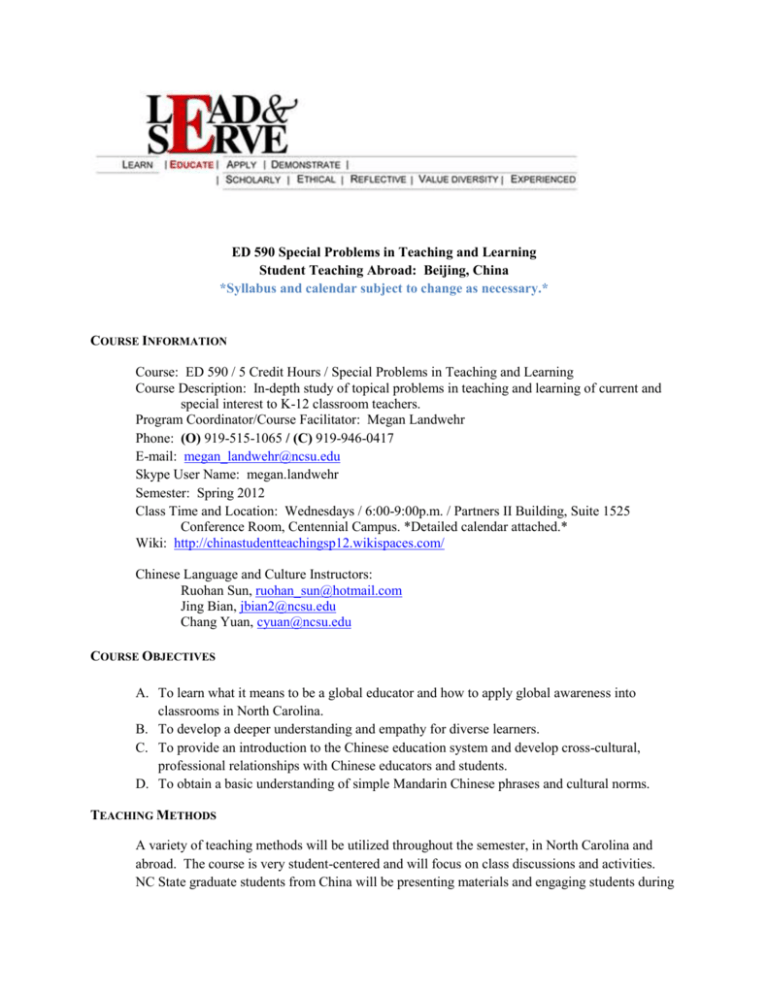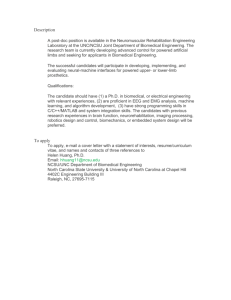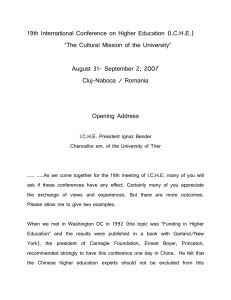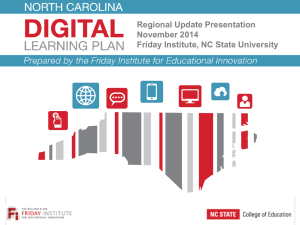ED 590 Syllabus_Special Problems_China_SP12
advertisement

ED 590 Special Problems in Teaching and Learning Student Teaching Abroad: Beijing, China *Syllabus and calendar subject to change as necessary.* COURSE INFORMATION Course: ED 590 / 5 Credit Hours / Special Problems in Teaching and Learning Course Description: In-depth study of topical problems in teaching and learning of current and special interest to K-12 classroom teachers. Program Coordinator/Course Facilitator: Megan Landwehr Phone: (O) 919-515-1065 / (C) 919-946-0417 E-mail: megan_landwehr@ncsu.edu Skype User Name: megan.landwehr Semester: Spring 2012 Class Time and Location: Wednesdays / 6:00-9:00p.m. / Partners II Building, Suite 1525 Conference Room, Centennial Campus. *Detailed calendar attached.* Wiki: http://chinastudentteachingsp12.wikispaces.com/ Chinese Language and Culture Instructors: Ruohan Sun, ruohan_sun@hotmail.com Jing Bian, jbian2@ncsu.edu Chang Yuan, cyuan@ncsu.edu COURSE OBJECTIVES A. To learn what it means to be a global educator and how to apply global awareness into classrooms in North Carolina. B. To develop a deeper understanding and empathy for diverse learners. C. To provide an introduction to the Chinese education system and develop cross-cultural, professional relationships with Chinese educators and students. D. To obtain a basic understanding of simple Mandarin Chinese phrases and cultural norms. TEACHING METHODS A variety of teaching methods will be utilized throughout the semester, in North Carolina and abroad. The course is very student-centered and will focus on class discussions and activities. NC State graduate students from China will be presenting materials and engaging students during the language and culture portions of the class. In China, students will participate in classes, events, and activities coordinated by Beijing Royal School. COURSE ASSIGNMENTS Guided Journal (40% of grade): Keep a running log of your thoughts, experiences, feelings, and reactions to student-teaching in a North Carolina classroom, travel, culture, and education system of China. Students should allow time to journal weekly in North Carolina and a minimum of 4 times per week in China. Method: Establish an on-line portal in which to keep your journal. You may use any on-line format you would like, but it is required to be electronic and follows set guidelines. Suggested web sites to use include www.wikispaces.com, www.weebly.com, or www.tumbler.com. E-mail the link to your on-line blog to Megan no later than January 18th, 2012. Journal Format/Guidelines: Adapted from NAFSA’s (Association of International Education) myCAP, “Cultural Awareness Profile.” Developed by Dr. Helen Marx and Dr. David Moss. Your weekly journal entries in North Carolina can involve experiences student teaching in the classroom, topics discussed in the Wednesday night ED 590 course, or anything else you wish to reflect upon. Before you leave for China, you should have at least 10 journal entries completed. At the very minimum, you must respond to one of the following questions each week before you leave for China (in any order you choose): 1. How do you define “global awareness”? Do you consider yourself a globally aware person? 2. Do you think internationalization/global issues should have a central place in a school’s curriculum? Explain your reasoning. 3. Describe the three categories/characteristics commonly used to compare culture groups. 4. How might you incorporate cultural awareness into your teaching? 5. Using up to 10 terms or phrases, describe your cultural identity. 6. In what ways might a teacher’s cultural identity influence the way they teach? 7. Consider a time when you talked with someone from another culture. How did this conversation differ from one with someone from your own culture? 8. What are some strategies you will implement to effectively teach students from different cultural background? While in China, students will journal at least four times per week. Entries can include a variety of topics, such as; daily schedule, cultural differences, observations about the schools, surprises, successes, frustrations, lessons learned, stories, descriptions, etc. Resources for recommended travel journaling are provided on the wiki. Reflective Essay (Due May 9th, 10% of grade): Review the responses you wrote to the eight journal questions during the first part of the semester again. Also, re-read your journal entries from time spent abroad and reflect about the whole experience. Write a 3-5 page reflective essay that addresses at least the following questions – Has your definition of global awareness changed? Why or why not? How has your understanding of your own cultural identity changed after your time abroad? What new skill sets have you gained that you will use in your career as a teacher? Action Plan Project & Presentation (30% total of grade): *Examples of Action Plan Projects are posted on the Wiki.* Project: Students will submit an action plan at the end of the semester outlining how they plan to use their experience in China as teachers in North Carolina. This project should outline specifically how Student Teaching Abroad has taught participants how to be better global educators. Action plan items do not need to entirely consist of country-specific ideas and lessons, but should reflect what it means to be a global educator in general terms. Action plans can be submitted in the format of your choosing. The action plan must include the following materials, at a minimum: A list of at least 10 specific strategies for utilizing global teaching methods throughout your career. Include as much detail as possible. Half of your strategies can include classroom environment. The other half should include subject-specific strategies. One sample lesson plan within your content area pertaining to what you learned in China. The lesson plan needs to follow the format as required by your department/content area and should utilize objectives from the North Carolina Standard Course of Study. Strategic plan for sharing what you learned with the school community or community outside of the school. The plan is realistic and obtainable. Participation and Attendance (20% of grade): It is very important that you attend the pre-departure classes and re-entry meeting to get the most out of your study abroad experience. This part of your grade will be based on your attendance in class and your participation in class discussions and activities. The course is designed to be very interactive, so please feel free to share your opinions and experiences with everyone in a safe environment. GRADE DISTRIBUTION & EVALUATION Grade Assignments: 100-98=A+; 97-94= A; 93-90=A-; 89-86=B+; 85-83=B; 82-80=B-; 79-76=C+; 75—73=C; 72-70= C-; 69-66= D+; 65-63= D; 62-60=D-. Attendance and Participation 20% This course follows the university policy for attendance, absences, and scheduling make-ups as listed on the following web site - http://policies.ncsu.edu/regulation/reg-02-20-3 Participation includes engaging with others’ ideas during class discussions, submitting assignments on a timely basis, and actively participating in all language and culture events during class and while abroad. Guided Journal 40% Journals will be evaluated based on the following criteria Entries are submitted on a regular and timely fashion as indicated by the syllabus (weekly in NC/daily in China, except for weekends). Journals follow the required format utilizing an on-line portal. Posts are reflective, thoughtful, and analytical. The writings include detail, expansion of ideas, and demonstrate learning and progress. Reflective Essay 10% Essays will be evaluated based on the following criteria Essays answer the question prompts within the page limit. Writing organized, clear, accurate, and free of grammatical errors. Essays provide thoughtful content, quality work, and analytical reflections of self. Action Plan Project 30% Projects will be evaluated based on the following criteria All three project elements are included in the action plan, containing at least the minimum required amount of material. Project elements are unique, creative, and individual. Plagiarism will result in automatic failure of the class. Strategies are clear, concise, and detailed. They list a combination of classroom environment strategies and content-specific strategies. The lesson plan follows the standard format used for each program/subject area. It includes objectives from NC’s Standard Course of Study. The lesson plan incorporates global awareness into a subject-specific lesson targeted at one age level. Plans include the following elements; Student Objectives, Opening Activity/Introduction, Outline of Activities, Closing Activity, Materials, Provision for Individual Students, Assessment. *A lesson plan template is posted on the Moodle site.* The plan for sharing with the community is realistic and obtainable. It should include as much detail as possible as well as supporting documents, if necessary. IMPORTANT INFORMATION Class Evaluations: The Study Abroad Office will provide confidential evaluation forms for the class and the program upon your return from China. These evaluation forms are required of each participant and class time will be used for you to complete the forms. One student will collect the completed evaluations and take them directly to the Study Abroad Office located in the First Year College Commons building on main campus. Academic Integrity: Students are bound by the academic integrity policy as stated in the code of student conduct. Therefore, students are required to uphold the university pledge of honor and exercise honesty in completing any assignment. See the website for a full explanation: http://www.ncsu.edu/policies/student_services/student_discipline/POL11.35.1.php Disability Services: Reasonable accommodations will be made for students with verifiable disabilities. In order to take advantage of available accommodations, students must register with Disability Services for Students at 1900 Student Health Center, Campus Box 7509, 515-7653. http://www.ncsu.edu/provost/offices/affirm_action/dss/ For more information on NC State's policy on working with students with disabilities, please see http://www.ncsu.edu/policies/academic_affairs/courses_undergrad/REG02.20.1.php CALENDAR Date January 18 Topic Introductions and Review of Syllabus “Global Awareness” Activity Due: Link to On-Line Journal Blog January 25 Cross-Cultural Communications – My CAP (Cultural Awareness Profile) Cultural Value Dimensions February 1 Education in China Language Introduction (Language lessons will be incorporated in all Chinese culture classes from this class forward.) February 8 Chinese Culture and Daily Life February 15 Culture and Daily Life Continued February 22 Politics, Government, and Religion of China February 29 Sightseeing and “Getting Around” Beijing March 7 Panel of former participants and trip leaders. (Tentative) March 14 Language Review and Practice March 21 Language Review and Practice Due: North Carolina portion of journals/answers to the 8 cultural awareness questions. March 28 On-Line Class Meeting via Elluminate Last-minute questions and travel logistics. April 1-May 5 Beijing, China! May 9 Re-Entry Meeting Due: All Journals, Action Plan Project, and Reflective Essay






